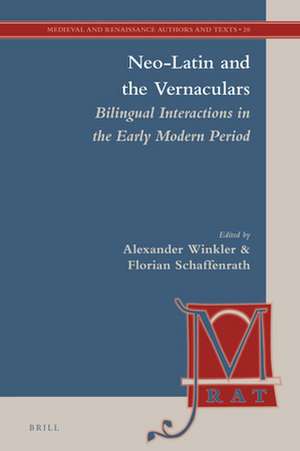Neo-Latin and the Vernaculars: Bilingual Interactions in the Early Modern Period: Medieval and Renaissance Authors and Texts, cartea 20
Florian Schaffenrath, Alexander Winkleren Limba Engleză Hardback – 14 noi 2018
Contributors are Giacomo Comiati, Ronny Kaiser, Teodoro Katinis, Francesco Lucioli, Giuseppe Marcellino, Marianne Pade, Maxim Rigaux, Florian Schaffenrath, Claudia Schindler, Federica Signoriello, Thomas Velle, Alexander Winkler.
Din seria Medieval and Renaissance Authors and Texts
- 18%
 Preț: 1186.38 lei
Preț: 1186.38 lei - 18%
 Preț: 615.22 lei
Preț: 615.22 lei - 18%
 Preț: 685.61 lei
Preț: 685.61 lei - 18%
 Preț: 717.59 lei
Preț: 717.59 lei - 18%
 Preț: 944.74 lei
Preț: 944.74 lei - 18%
 Preț: 1012.77 lei
Preț: 1012.77 lei - 18%
 Preț: 1255.73 lei
Preț: 1255.73 lei - 18%
 Preț: 568.58 lei
Preț: 568.58 lei - 18%
 Preț: 546.47 lei
Preț: 546.47 lei - 18%
 Preț: 972.83 lei
Preț: 972.83 lei - 18%
 Preț: 655.86 lei
Preț: 655.86 lei - 18%
 Preț: 626.27 lei
Preț: 626.27 lei - 18%
 Preț: 658.93 lei
Preț: 658.93 lei - 18%
 Preț: 611.15 lei
Preț: 611.15 lei - 18%
 Preț: 684.15 lei
Preț: 684.15 lei - 18%
 Preț: 679.63 lei
Preț: 679.63 lei - 15%
 Preț: 498.42 lei
Preț: 498.42 lei - 18%
 Preț: 526.38 lei
Preț: 526.38 lei - 18%
 Preț: 681.43 lei
Preț: 681.43 lei - 18%
 Preț: 1107.88 lei
Preț: 1107.88 lei - 18%
 Preț: 861.59 lei
Preț: 861.59 lei - 18%
 Preț: 1011.49 lei
Preț: 1011.49 lei - 18%
 Preț: 776.52 lei
Preț: 776.52 lei - 18%
 Preț: 632.00 lei
Preț: 632.00 lei
Preț: 725.15 lei
Preț vechi: 884.33 lei
-18% Nou
Puncte Express: 1088
Preț estimativ în valută:
138.76€ • 145.24$ • 115.49£
138.76€ • 145.24$ • 115.49£
Carte indisponibilă temporar
Doresc să fiu notificat când acest titlu va fi disponibil:
Se trimite...
Preluare comenzi: 021 569.72.76
Specificații
ISBN-13: 9789004384866
ISBN-10: 9004384863
Dimensiuni: 155 x 235 mm
Greutate: 0.52 kg
Editura: Brill
Colecția Brill
Seria Medieval and Renaissance Authors and Texts
ISBN-10: 9004384863
Dimensiuni: 155 x 235 mm
Greutate: 0.52 kg
Editura: Brill
Colecția Brill
Seria Medieval and Renaissance Authors and Texts
Cuprins
Notes on Contributors
1 Introduction
Alexander Winkler and Florian Schaffenrath
2 Latin and the Vernacular in Biondo Flavio’s Thought and Works: a Study with a New Critical Edition of the Correspondence with the Duke of Milan, Francesco Sforza
Giuseppe Marcellino
3 Latin and Vernacular Interplay: Lazzaro Bonamico as Author and Character of Sperone Speroni’s Dialogo delle lingue
Teodoro Katinis
4 Diserte Germanice loqui: the Cultural-Historical Status of the German Language in Franciscus Irenicus’s Germaniae Exegesis (1518)
Ronny Kaiser
5 Ludvig Holberg’s Niels Klim (1741) and the Irony of Reading and Writing in Latin
Thomas Velle
6 Neo-Latin and Vernacular Translation Theory in the 15th and 16th Centuries: ‘the Tasks of the Translator’ According to Leonardo Bruni and Étienne Dolet
Marianne Pade
7 Ariosto Latine Redditus: Early Modern Neo-Latin Rewritings of the Orlando Furioso
Francesco Lucioli
8 Rewriting Vernacular Prose in Neo-Latin Hexameters: Francisco de Pedrosa’s Austriaca sive Naumachia (1580)
Maxim Rigaux
9 Neo-Latin Epic Poetry on Telemach after Fénelon
Florian Schaffenrath
10 Coexistence and Contamination of Vernacular and Latin in Alessandro Braccesi’s Bilingual Tribute to Camilla Saracini: the Literatures of Siena and Florence between Illustrious Women and Neoplatonism
Federica Signoriello
11 The Reception of Petrarch and Petrarchists’ Poetry in Marcantonio Flaminio’s Carmina
Giacomo Comiati
12 Pietro Angeli da Barga’s Syrias (1582–91) and Contemporary Debates over Epic Poetry
Alexander Winkler
13 Didactic Poetry as Elitist Poetry: Christopher Stay’s De poesi didascalica dialogus in the Context of Classical and Neo-Latin Didactic Discourse
Claudia Schindler
Index
1 Introduction
Alexander Winkler and Florian Schaffenrath
2 Latin and the Vernacular in Biondo Flavio’s Thought and Works: a Study with a New Critical Edition of the Correspondence with the Duke of Milan, Francesco Sforza
Giuseppe Marcellino
3 Latin and Vernacular Interplay: Lazzaro Bonamico as Author and Character of Sperone Speroni’s Dialogo delle lingue
Teodoro Katinis
4 Diserte Germanice loqui: the Cultural-Historical Status of the German Language in Franciscus Irenicus’s Germaniae Exegesis (1518)
Ronny Kaiser
5 Ludvig Holberg’s Niels Klim (1741) and the Irony of Reading and Writing in Latin
Thomas Velle
6 Neo-Latin and Vernacular Translation Theory in the 15th and 16th Centuries: ‘the Tasks of the Translator’ According to Leonardo Bruni and Étienne Dolet
Marianne Pade
7 Ariosto Latine Redditus: Early Modern Neo-Latin Rewritings of the Orlando Furioso
Francesco Lucioli
8 Rewriting Vernacular Prose in Neo-Latin Hexameters: Francisco de Pedrosa’s Austriaca sive Naumachia (1580)
Maxim Rigaux
9 Neo-Latin Epic Poetry on Telemach after Fénelon
Florian Schaffenrath
10 Coexistence and Contamination of Vernacular and Latin in Alessandro Braccesi’s Bilingual Tribute to Camilla Saracini: the Literatures of Siena and Florence between Illustrious Women and Neoplatonism
Federica Signoriello
11 The Reception of Petrarch and Petrarchists’ Poetry in Marcantonio Flaminio’s Carmina
Giacomo Comiati
12 Pietro Angeli da Barga’s Syrias (1582–91) and Contemporary Debates over Epic Poetry
Alexander Winkler
13 Didactic Poetry as Elitist Poetry: Christopher Stay’s De poesi didascalica dialogus in the Context of Classical and Neo-Latin Didactic Discourse
Claudia Schindler
Index
Notă biografică
Alexander Winkler is research assistant in Medieval and Neo-Latin philology at the University of Bonn. He published a German translation of the Satire against the Abuse of Tobacco by the 17th-century Jesuit Jacob Balde and is currently preparing a monograph on Pietro Angeli da Barga's (1517-1596) epic poem Syrias.
Florian Schaffenrath, Ph.D. (2005), University of Innsbruck, is associate professor of Classics and director of the Ludwig Boltzmann Institute for Neo-Latin Studies. He wrote his Habilitation on Cicero's Philippics (2014), and has published on Neo-Latin literature, particularly Neo-Latin epic poetry.
Florian Schaffenrath, Ph.D. (2005), University of Innsbruck, is associate professor of Classics and director of the Ludwig Boltzmann Institute for Neo-Latin Studies. He wrote his Habilitation on Cicero's Philippics (2014), and has published on Neo-Latin literature, particularly Neo-Latin epic poetry.
